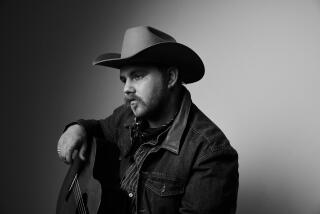EMERSON, LAKE EMERGE WITH . . . COZY POWELL
- Share via
Emerson, Lake and . . . who ?
Yes, it’s Emerson, Lake and Powell now--not Palmer.
In its original form, Emerson, Lake and Palmer was one of the supergroups of the ‘70s: a rock trio known for its flamboyant stage shows and grandiose mixture of classical and rock influences. With the arrival of rock’s back-to-basics new wave movement, however, the trio was one of many bands ridiculed as an obsolete relic--and the group called it quits in 1979.
Two years ago, when keyboardist Keith Emerson and singer-guitarist Greg Lake began making plans for its current reunion, drummer Cozy Powell was at their side--not Carl Palmer.
So, it’s not hard to guess the first question posed to the band members during interviews on their current tour, which includes stops Thursday at the Greek Theatre and Friday at the Pacific Amphitheatre.
But rehashing some answers didn’t faze Lake--a big, boisterous Englishman.
No, he said, good-naturedly during a recent interview: Powell wasn’t chosen as Palmer’s replacement just so the band’s nickname, ELP, could be retained.
“We were just auditioning drummers and Cozy happened to fit what we wanted,” replied Lake, 38. “He could have been Cozy Smith or Cozy Jones. We would still have hired him.”
The other obvious question is why Palmer, the drummer from their glory days in the ‘70s, wasn’t included in the reunion. Lake had been chuckling his way through the interview, but he carefully answered the questions about Palmer, who was a member of Asia in recent years.
“I won’t knock Carl,” he said. “The question of using him in this group never came up. We wouldn’t have had a comfortable future working with him again.”
When Powell was hired, Emerson and Lake were just interested in recording an album, not reviving ELP. They were just looking for a good session drummer.
“When Cozy came in, he really dazzled us,” Lake recalled. “We didn’t intend to put the group back together. But he was such a good technical drummer and such a good performer, we thought it might be a good idea to go back out with a new version of the old band.”
At first there was a question about what to call the band. With a completely different name, fans wouldn’t know it was a revised version of ELP. But, they speculated, using Emerson and Lake in the title would probably generate snide comments about the return of rock ‘n’ roll dinosaurs.
“Of course, with this name people are saying we’re leaning on the past,” Lake said. “But why not? We have every right to do that. We spent years building the ELP name.”
Lake was candid about why he and Emerson revived ELP. “To make money really,” he replied, laughing. The comment, though, seemed dead serious.
Neither he nor Emerson had been prospering. Emerson was reportedly unhappy writing film scores and wasn’t interested in solo performing. “He could never find the right vehicle of expression,” Lake said. “He’s not a singer and he didn’t really want to make an instrumental album. He didn’t have a lot of options.”
Lake had tried a solo career, but his two albums, which didn’t emphasize his strengths, flopped. “My solo records were in the wrong direction,” he explained. “I had played with keyboards all those years. But I’m a guitar player. I wanted an opportunity to play with other guitar players. But that direction wasn’t the best thing for my career. It was a real mistake.”
Emerson, Lake and Palmer’s final album, “Love Beach” (1978), was by far their worst. Lake said he and his colleagues never even wanted to make that album.
“We were forced to make it for contractual reasons,” he insisted. “We were exhausted from endless touring. We wanted to retire at that point. We didn’t have enough energy or good ideas to make a good record. We knew it too. We told Atlantic Records (their label at the time), but they wanted the album anyway. It was the final nail in our coffin.”
ELP had a notion that today’s pop music fans were ready for a progressive-rock revival. That may have been a miscalculation. The sparkling progressive-rock on the “Emerson, Lake and Powell” album did not ignite the sales charts, peaking at No. 23 in the Billboard magazine.
The other major progressive-rock bands, Genesis and Yes, have survived in the ‘80s by switching to pop-rock. Why didn’t ELP also opt for the easy out?
“We figured we’d be damned either way,” Lake replied. “If we did slick pop, everyone would have ripped us apart. If we maintained our musical identity and picked up where we left off in the ‘70s, we’d be damned for that too. We figured we might as well be damned for doing music we love.”
More to Read
The biggest entertainment stories
Get our big stories about Hollywood, film, television, music, arts, culture and more right in your inbox as soon as they publish.
You may occasionally receive promotional content from the Los Angeles Times.










